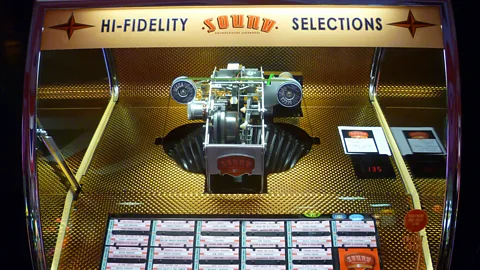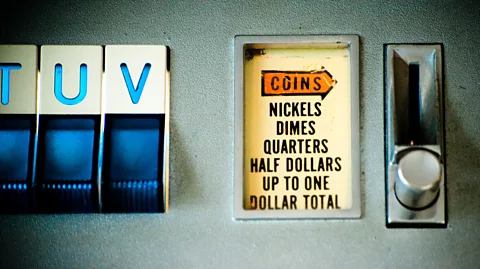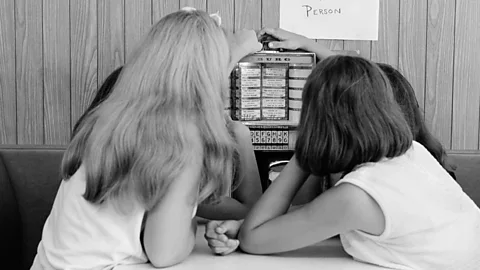Why fans of vintage vinyl love this brand-new machine
 Norman Miller
Norman MillerIs this the new jukebox jive?
A British company just unveiled the hottest new machine for vinyl fans: the only new record-playing jukebox available anywhere in the world.
It may be an era of summoning songs with a digital flick – but vinyl is back. Younger music fans are discovering not only the warmth and fullness of the vinyl sound but the pleasure of its rituals: browsing a well-designed sleeve; lowering a stylus onto a spinning disc.
With their bold styling and 1950s aura, jukeboxes add extra mystique. But while vinyl records are still being produced, the jukeboxes that play 7-inch singles are not.
Until now. The hand-built jukebox makers Sound Leisure, based in Leeds in the UK, have just unveiled their first new vinyl jukebox in 20 years. It’s the only new vinyl jukebox available anywhere in the world.
The Rocket Vinyl, which will be produced this summer, takes its moniker from the song Rocket 88 by Jacki Brenston & the Delta Cats, hailed as the first true rock 'n' roll record when it was released in 1951.
 Sound Leisure
Sound LeisureSound Leisure, one of only two companies left making classic hand-built jukeboxes in the world (the other is US firm Rockola), already has a range of CD-playing jukeboxes. Every machine is hand-built and custom-finished; they’ve been sold to clients from Coca-Cola to the Elvis Presley estate.
In April, the British Phonographic Industry (BPI) announced UK sales of just over 637,000 LP albums for the first quarter of 2016 - a 62% rise on the same period in 2015, and the eighth quarterly rise in a row.
But the Rocket Vinyl has generated new levels of interest. There’s a waiting list of people who want to go on the waiting list; dozens of orders, along with £1,000 ($1,500) deposits (the jukebox will retail for around £8,000), have been placed from both UK and overseas fans.
“Because we hand-build our products, it's never going to be a mass market,” says Colin Vernon, Sound Leisure's Classic Jukeboxes Division Head. “It could be we only manufacture between 20 and 50 jukeboxes a year.”
I examine the Rocket Vinyl prototype at Brighton's annual Jukebox & Retro Fair. Around me, jive dancers swing to a live rockabilly band while collectors amass at stalls covered with old vinyl 7-inch singles. A handful of companies are selling restored classic vintage jukeboxes – ranging from a 1958 Bal-Ami S100 for £5,995 ($8,700) to a 1958 AMI I200E for £12,750 ($18,500).
“Sometimes, in a market like this there are people who don't like anything new,” Vernon says. “But it's been welcomed.”
The Rocket takes its style cues from machines that popped up in British cafes in the 1950s and 60s, back when bongos were big and Elvis Presley was jailhouse-rocking. The big glass front makes a show of the mechanics as vinyl is lifted into place – a contrast to the closed-up domes of colourful old American jukeboxes, like the Wurlitzer.
The most expensive jukebox ever sold at auction was a Wurlitzer - a 1942 Wurlitzer model 1950 designed by Paul Fuller, which was sold by Christie's in their LA auction room in 2001 for $22,325.
 Alamy
AlamyBut the Rocket combines modern technology with retro style, giving it a far better technical sound quality than vintage machines. Vernon points out that audio quality was never meant to be a feature 50 years ago.
“Jukeboxes were played in a public environment with a lot of ambient noise, where you couldn't hear the finer points of the music,” he says.
Engineers at Sound Leisure spent three years working out exactly how to make a modern vinyl jukebox. It required uniting the old medium of vinyl with specially-developed modern versions of things that no longer are being made, such as stylus cartridges.
If the Rocket is as popular as it sounds, it seems likely Rockola may follow Sound Leisure's lead, producing their own new vinyl model.
But Vernon seems unworried. Rather than the US, Sound Leisure focuses their always-small production on the UK as well as Holland, France, Belgium and Germany – places where a love of jukeboxes and related cultural crossover were instilled by US troops stationed there after World War II.
Today's more usual luxury goods consumers, like Russian oligarchs or Chinese billionaires, however, tend to be missing from Sound Leisure’s client list. “Because those countries never had a jukebox culture, they've no relationship with jukeboxes or a nostalgic viewpoint,” says Vernon. “Any sales would be just on the bling factor.”
 Alamy
AlamyEvery Rocket Vinyl will offer clients a choice of 140 tracks (that's 70 singles, kids – they've got two sides...). But it doesn’t seem there will be any difficulty sourcing that number of necessary singles: the company can tap into a booming market in original vinyl, and record companies such as the BBC-owned Demon Records offer ready-made collections of re-pressed vinyl from rock 'n' roll to punk.
Vernon says the volume of new pressings of old songs will only increase.
“Record companies have never been slow to miss a trick to turn over a buck,” he says wryly. “Lots of young people are now digging into different genres for the first time. It can only be good for music.”
Sounds like it’s time to get in line for the new jukebox jive.
This story is a part of BBC Britain – a series focused on exploring this extraordinary island, one story at a time. Readers outside of the UK can see every BBC Britain story by heading to the Britain homepage; you also can see our latest stories by following us on Facebook and Twitter.
To comment on this story or anything else you have seen on BBC Capital, head over to our Facebook page or message us on Twitter.
If you liked this story, sign up for the weekly bbc.com features newsletter, called “If You Only Read 6 Things This Week”. A handpicked selection of stories from BBC Future, Earth, Culture, Capital, Travel and Autos, delivered to your inbox every Friday.
